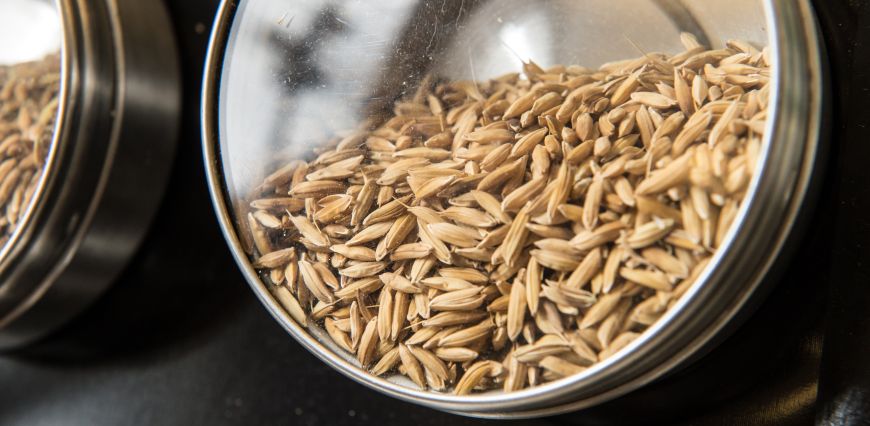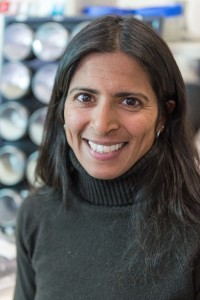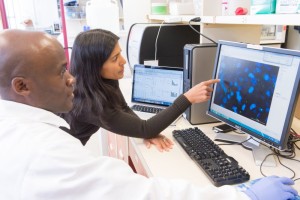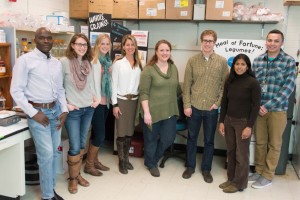
From her early study of a single molecule to her current focus on global nutrition, Elizabeth Ryan not only is focused on whole foods – she is thinking about the whole world.

Imagine one of those computer animations that starts with a close-up of a cell, and then zooms out to show the whole planet. That’s Ryan’s career. The assistant professor of toxicology in the College of Veterinary Medicine and Biomedical Sciences is capable of zooming in on an issue, and pulling back to see the larger picture, all while teaching and conducting research.
Ryan is one of two researchers receiving a CVMBS-Zoetis Early Career Research Award at the college’s annual Research Day on Saturday. The event showcases through posters and presentations the research efforts of students and other young investigators in the college. It will run noon to 6:30 p.m. Saturday at the Hilton Fort Collins; Ryan and fellow awardee, Candace Mathiason, will kick off Research Day with talks about their work.
Ryan, based in the Department of Environmental and Radiological Health Sciences, will speak about her multidisciplinary work with rice bran and dry beans – and the role these foods could have in promoting digestive health and preventing obesity, heart disease and cancer.
Improving food systems to promote health
Ryan majored in environmental science and biology at Bowling Green State University, with a gymnastics scholarship. After college, she went to Nepal with the Peace Corps, and then worked with Hawk Watch International, where she became interested in raptors’ exposure to hazardous chemicals. Inspired to study toxicology, she earned her master’s degree and Ph.D. in molecular toxicology and environmental medicine.

“When I first came to CSU, I was very focused on looking at plant-based food and understanding all the small molecules in plant foods that are beneficial and disease-fighting,” Ryan said. “That got me thinking back to what I knew about molecules that enhance immune function. Once I started studying food more, I realized how challenged we are with creating sustainable food systems, locally and globally.”
Just as she can shift focus from the cellular level to the global, Ryan is equally at ease discussing the emotion that connects her to science.
“The meaning of food to social well-being and quality of life has always been fascinating to me. I grew up in that, being of Indian culture. Quality food is a fully appreciated part of family life,” said Ryan, whose family is from Kerala, India. “The work I am doing brings a layer of satisfaction in knowing that if you can do anything to improve a food system, you’ve helped humanity in some way.”
Listen to Dr. Ryan’s free webinar, Functional Foods for Life, by signing in with your email and phone, here.
Helping more than humans
Ryan’s lab embodies the One Health movement, which seeks global public-health solutions at the juncture of human, animal and environmental health.
Her work on bean-based diets in dogs has shown benefits for weight control and, potentially, intestinal cancer management, said Dr. Sue VandeWoude, associate dean of research for the College of Veterinary Medicine and Biomedical Sciences. Ryan’s studies in rodents and pigs are helping to understand how rice bran and legumes can improve intestinal immunity and protect against disease.
“She is working on demonstrating the benefit of these diets for people—particularly infants and young children in developing countries—by applying what she has learned in animals to people,” VandeWoude said.
Another goal is “to find out whether these foods also may help us eliminate chemicals from our body, because we all are exposed, whether we like it or not, to a larger range of chemicals than we ever imagined before,” Ryan said.
She takes as much care with her relationships as she does with the rigor of her research.

“Elizabeth Ryan has more collaborators than anyone I know. She has worked with people in all eight colleges and in all four departments in CVMBS,” VandeWoude said. “I sometimes run into her around Fort Collins, and it seems everyone in the community knows her, too, judging by how many people stop to tell her ‘hello.’ She is vivacious, has limitless energy, and her mind makes connections constantly. She is also determined and fearless.”
Ryan has joint appointments in the Department of Food Science and Human Nutrition, the Colorado School of Public Health and the University of Colorado Cancer Center.
“I like the big picture. I have created a very diverse lab. It’s very important to me that people are trained in a multidisciplinary environment, but yet do not lose sight of their training and focus area,” said Ryan, whose lab collaborates with researchers across the country and in Mali, Kenya, Nicaragua, Nepal and India.
She has received funding from the Bill and Melinda Gates Foundation, National Institutes of Health-National Cancer Institute, University of Colorado Cancer Center, and the Dry Bean Health Research Group.
“I’m trying to stay very grounded in what I have intentions to do, as opposed to just focusing on how many dollars it’s going to take to do it,” Ryan said. “I feel pretty excited about the efficiency of my lab, the money we have received to do exciting work, and what we’ve been able to accomplish with it so far.”